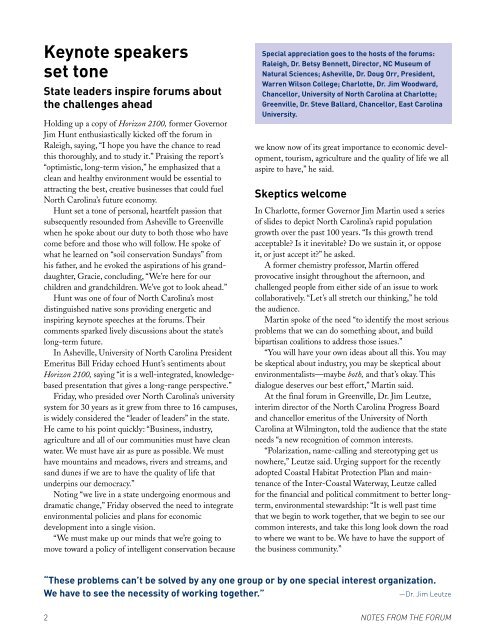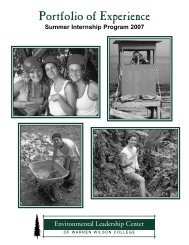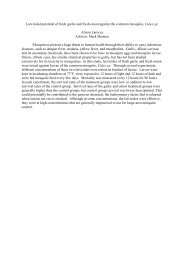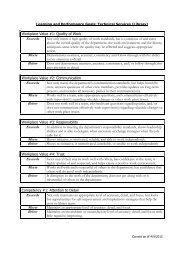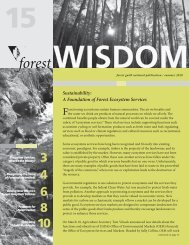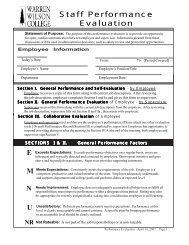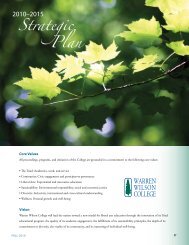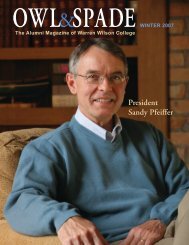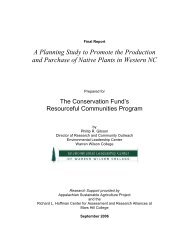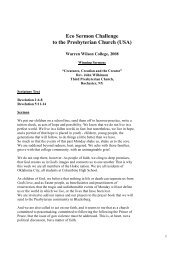here. - Warren Wilson College
here. - Warren Wilson College
here. - Warren Wilson College
Create successful ePaper yourself
Turn your PDF publications into a flip-book with our unique Google optimized e-Paper software.
Keynote speakers<br />
set tone<br />
State leaders inspire forums about<br />
the challenges ahead<br />
Holding up a copy of Horizon 2100, former Governor<br />
Jim Hunt enthusiastically kicked off the forum in<br />
Raleigh, saying, “I hope you have the chance to read<br />
this thoroughly, and to study it.” Praising the report’s<br />
“optimistic, long-term vision,” he emphasized that a<br />
clean and healthy environment would be essential to<br />
attracting the best, creative businesses that could fuel<br />
North Carolina’s future economy.<br />
Hunt set a tone of personal, heartfelt passion that<br />
subsequently resounded from Asheville to Greenville<br />
when he spoke about our duty to both those who have<br />
come before and those who will follow. He spoke of<br />
what he learned on “soil conservation Sundays” from<br />
his father, and he evoked the aspirations of his granddaughter,<br />
Gracie, concluding, “We’re <strong>here</strong> for our<br />
children and grandchildren. We’ve got to look ahead.”<br />
Hunt was one of four of North Carolina’s most<br />
distinguished native sons providing energetic and<br />
inspiring keynote speeches at the forums. Their<br />
comments sparked lively discussions about the state’s<br />
long-term future.<br />
In Asheville, University of North Carolina President<br />
Emeritus Bill Friday echoed Hunt’s sentiments about<br />
Horizon 2100, saying “it is a well-integrated, knowledgebased<br />
presentation that gives a long-range perspective.”<br />
Friday, who presided over North Carolina’s university<br />
system for 30 years as it grew from three to 16 campuses,<br />
is widely considered the “leader of leaders” in the state.<br />
He came to his point quickly: “Business, industry,<br />
agriculture and all of our communities must have clean<br />
water. We must have air as pure as possible. We must<br />
have mountains and meadows, rivers and streams, and<br />
sand dunes if we are to have the quality of life that<br />
underpins our democracy.”<br />
Noting “we live in a state undergoing enormous and<br />
dramatic change,” Friday observed the need to integrate<br />
environmental policies and plans for economic<br />
development into a single vision.<br />
“We must make up our minds that we’re going to<br />
move toward a policy of intelligent conservation because<br />
Special appreciation goes to the hosts of the forums:<br />
Raleigh, Dr. Betsy Bennett, Director, NC Museum of<br />
Natural Sciences; Asheville, Dr. Doug Orr, President,<br />
<strong>Warren</strong> <strong>Wilson</strong> <strong>College</strong>; Charlotte, Dr. Jim Woodward,<br />
Chancellor, University of North Carolina at Charlotte;<br />
Greenville, Dr. Steve Ballard, Chancellor, East Carolina<br />
University.<br />
we know now of its great importance to economic development,<br />
tourism, agriculture and the quality of life we all<br />
aspire to have,” he said.<br />
Skeptics welcome<br />
In Charlotte, former Governor Jim Martin used a series<br />
of slides to depict North Carolina’s rapid population<br />
growth over the past 100 years. “Is this growth trend<br />
acceptable Is it inevitable Do we sustain it, or oppose<br />
it, or just accept it” he asked.<br />
A former chemistry professor, Martin offered<br />
provocative insight throughout the afternoon, and<br />
challenged people from either side of an issue to work<br />
collaboratively. “Let’s all stretch our thinking,” he told<br />
the audience.<br />
Martin spoke of the need “to identify the most serious<br />
problems that we can do something about, and build<br />
bipartisan coalitions to address those issues.”<br />
“You will have your own ideas about all this. You may<br />
be skeptical about industry, you may be skeptical about<br />
environmentalists—maybe both, and that’s okay. This<br />
dialogue deserves our best effort,” Martin said.<br />
At the final forum in Greenville, Dr. Jim Leutze,<br />
interim director of the North Carolina Progress Board<br />
and chancellor emeritus of the University of North<br />
Carolina at Wilmington, told the audience that the state<br />
needs “a new recognition of common interests.<br />
“Polarization, name-calling and stereotyping get us<br />
now<strong>here</strong>,” Leutze said. Urging support for the recently<br />
adopted Coastal Habitat Protection Plan and maintenance<br />
of the Inter-Coastal Waterway, Leutze called<br />
for the financial and political commitment to better longterm,<br />
environmental stewardship: “It is well past time<br />
that we begin to work together, that we begin to see our<br />
common interests, and take this long look down the road<br />
to w<strong>here</strong> we want to be. We have to have the support of<br />
the business community.”<br />
“These problems can’t be solved by any one group or by one special interest organization.<br />
We have to see the necessity of working together.”<br />
—Dr. Jim Leutze<br />
2 NOTES FROM THE FORUM


